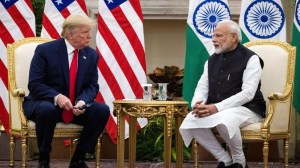Kerry shuts doors on Bush welcome
Senator John Kerry may be a liberal and President Bush a conservative, but when the subject of immigration finally came up in their debates,...

Senator John Kerry may be a liberal and President Bush a conservative, but when the subject of immigration finally came up in their debates, the two seemed to switch roles.
Bush spoke with compassion in the final debate about Mexican workers coming north 8216;8216;to put food on the table for their families8217;8217;, while Kerry slammed Bush for 8216;8216;the fact that we have people from the Middle East, allegedly, coming over the border8217;8217;.
Their comments highlighted a national schizophrenia on immigration and the ensuing policy contradictions 8212; intensified by the 9/11 attacks 8212; that analysts say the next president must face given the nation8217;s huge undocumented population, now estimated at 8 million people. 8216;8216;Whoever is President is going to have to do things on immigration that are going to be controversial across party lines and within their parties,8221; said Doris Meissner, chief of the Immigration and Naturalization Service during the Clinton administration, now at the Migration Policy Institute.
Many voters are angry that millions enter the country illegally and fear that their presence proves how easily terrorists might also slip through the borders. At the same time, many are proud of the nation8217;s immigrant history and, from a practical standpoint, readily consume the services these workers provide.
Kerry called for a 8216;8216;crackdown8217;8217; on employers who hire illegal aliens and bashed Bush for not pouring more money into patrolling the southern border. Bush touted his proposal to offer temporary legalisation for people illegally in the country, while accusing Kerry of supporting an amnesty.
But, neither Bush nor Kerry have talked much on the subject. That8217;s because immigration splits the Republican Party like no other issue, analysts noted, and also causes rifts among Democrats.
In fact, both candidates have proposed guest-worker programmes and expanded opportunity for citizenship that immigration analysts contend are critical to addressing US labour market needs and the security and human rights issues posed by the large pool of undocumented workers.
Such ideas are also unpopular with many voters, leading to contradictions evident in US policy for decades, but magnified by the 9/11 attacks. Congress initially reacted to the attacks with strong new laws to tighten border security. But as those began to take effect, Congress held hearings expressing outrage about how these same laws were damaging tourism and discouraging overseas scientists and students from coming to work and study here.
Bush set out in his presidency to make improved relations with Mexico the centre of his foreign policy. He challenged the anti-immigrant wing of his party, insisting that 8216;8216;family values don8217;t stop at the Rio Grande8217;8217;. But after 9/11, the mood shifted sharply against immigration, and Bush abandoned those efforts. When he announced a major immigration reform proposal last January, it was vilified by immigrant advocates as inadequate and set off a backlash in his party.
Bush8217;s proposal was centered on a temporary guest-worker programme for low-skilled workers that would give undocumented workers legal status. Conservatives blasted it as a backdoor amnesty.
8216;8216;If an American employer is offering a job that American citizens are not willing to take, we ought to welcome a person who is willing to take that job,8217;8217; Bush said at the time.
But immigration divides Democrats too, over how liberal the expanded legalisation and how tough enforcement of borders should be. 8212;NYT
A Jekyll-and-Hyde campaign, this
8226; Kerry for a 8216;8216;crackdown8217;8217; on employers hiring illegal aliens; bashed Bush for not spending more on patrolling southern border
8226; Bush for temporary legalisation of people illegally present in the country
- 01
- 02
- 03
- 04
- 05































